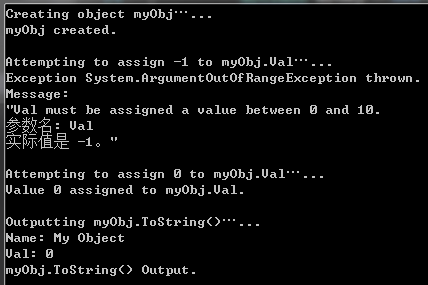using System;
using System.Collections.Generic;
using System.Linq;
using System.Text;
using System.Threading.Tasks;
namespace Ch10Ex01
{
public class MyClass
{
public readonly string Name;
private int intVal;
public int Val
{
get
{
return intVal;
}
set
{
if (value >= 0 && value <= 10)
intVal = value;
else
throw (new ArgumentOutOfRangeException("Val", value,
"Val must be assigned a value between 0 and 10."));
}
}
public override string ToString()
{
return "Name: " + Name + "
Val: " + Val;
}
private MyClass() : this("Default Name")
{
}
public MyClass(string newName)
{
Name = newName;
intVal = 0;
}
}
}

using System; using System.Collections.Generic; using System.Linq; using System.Text; using System.Threading.Tasks; namespace Ch10Ex01 { class Program { static void Main(string[] args) { Console.WriteLine("Creating object myObj…..."); MyClass myObj = new MyClass("My Object"); Console.WriteLine("myObj created."); for (int i = -1; i <= 0; i++) { try { Console.WriteLine(" Attempting to assign {0} to myObj.Val…...", i); myObj.Val = i; Console.WriteLine("Value {0} assigned to myObj.Val.", myObj.Val); } catch (Exception e) { Console.WriteLine("Exception {0} thrown.", e.GetType().FullName); Console.WriteLine("Message: "{0}"", e.Message); } } Console.WriteLine(" Outputting myObj.ToString()…..."); Console.WriteLine(myObj.ToString()); Console.WriteLine("myObj.ToString() Output."); Console.ReadKey(); } } }

